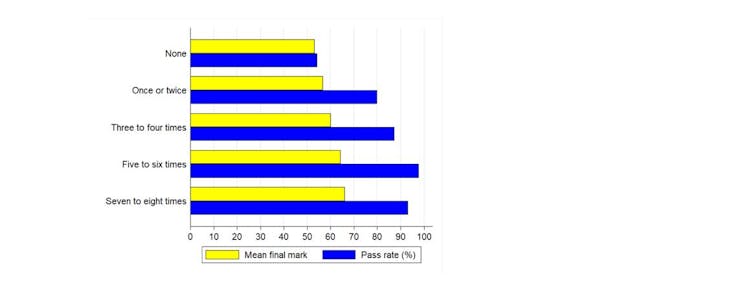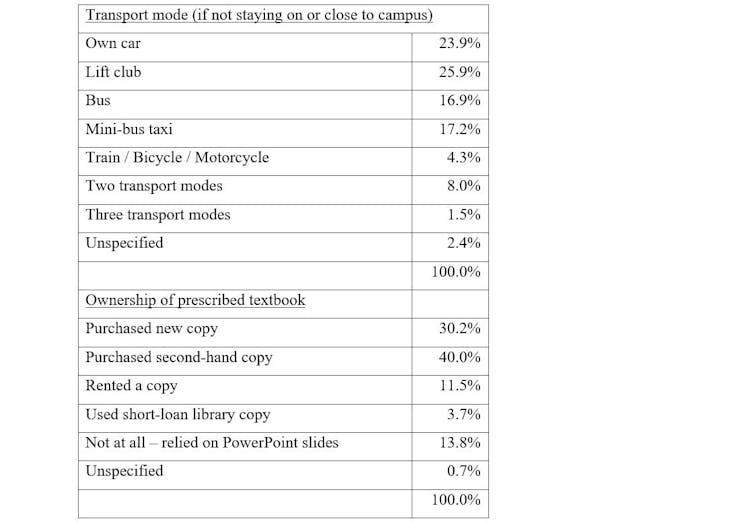
Christie Swanepoel, University of the Western Cape; Derek Yu, University of the Western Cape, and Rochelle Beukes
Over the last couple of decades, factors influencing the success of first-year university students have been comprehensively studied and researched. These studies focused on a wide range of factors including personal characteristics, school performance specifically Grade 12 (Matric) entry points and school subject choices.
The research also considered study characteristics like lecture attendance, tutorial attendance and study hours.
But one research gap remains – the causes of low lecture attendance.
Our recently published study looked at this. The study was conducted in 2019 among first-year microeconomics students at the University of the Western Cape. We examined the impact of students’ personal and school characteristics, the university’s environment, student attendance and the causes of not attending classes. We used a survey to capture reasons why students weren’t attending classes continuously over three weeks.
We found that lecture attendance was particularly lower in the afternoon and on Fridays. The main reason students gave for not attending classes was that they were busy studying for tests or completing assignments. Some students relied on PowerPoint slides (instead of using prescribed textbooks) to study, and some spent a lot of time travelling to campus because they used two or even three transport modes to get there. All these factors could have negative implications on students’ academic performances.
The research
A total of 672 students took part in our study. The majority were aged between 19-20 years in 2019. Most of the students were Black (56%) and Coloured (39%) – people of both European and African ancestry.
More than 60% of the students completed high school in Western Cape schools. Just over 82% of them did at least one commerce subject in school. These were accounting (71%), business studies (50%) and economics (30%).
A very high share of 94.72% did math (instead of maths literacy) in Matric. The high proportion of students enrolled in math is encouraging as it is more difficult than maths literacy. Doing maths instead of maths literacy helps students cope better with the highly quantitative subjects at tertiary level. The university also provides additional foundation modules, such as quantitative literacy, for commerce students who did maths literacy.
A concerning finding was that the majority of students only attended between one and four lectures during the three-week period. In particular, lecture attendance was significantly lower in the last period of the day (15:30-16:30) and on Fridays.
But tutorial attendance was high – two-thirds attended all four tutorials. Tutorials are additional academic support to students where they go through various in-class exercises to help them prepare better for the module tests and exams. The high tutorial attendance was expected, because students were required to submit assessments during the tutorial period. Tutorial attendance was thus “compulsory” as it gave students some merit to attend.
A very high portion of the students (89%) successfully qualified to write the final exam through achieving at least 40 marks in the continuous assessment mark. For those who wrote the final exam, the pass rate of the module was 75%.

Comparing lecture attendance with academic performance, the graph shows that higher attendance was associated with higher mean final mark and pass rate. In particular, students who attended at least five out of eight lectures, scored a 90% and above pass rate.

Students who claimed they missed at least one lecture were asked to give a reason. Almost all the top reasons were academically related:
Busy studying for tests (37%).
Lectures are not stimulating (28%).
Need to complete assignments (22%).
Online learning resources on the University of the Western Cape’s e-teaching (or iKamva) website are sufficient to cope with studies (21%).
Tutorials are great and can replace lectures (18%).
Unreliable mode of transport that was not on time (13%).
Students who reported they didn’t attend lectures because they thought tutorials could replace lectures scored significantly lower exam marks.
Conclusion and recommendations
First, we suggest the way students are taught be changed given some of them prefer examples to be done in tutorials rather than explanations or summaries of textbooks that come form lectures.
One option is to experiment moving away from the traditional lecture structure. As new digital technology is available and has now been more intensively adopted because of the COVID-19 pandemic, students will increasingly learn through flexible online learning. Teaching and learning will be a hybrid of face-to-face classes on campus and virtual learning.
Some students believe that online materials are replacements for the textbook. Yet when they study with just the online material they perform significantly worse. Given that some students come from poor households, a faculty or university-level textbook renting programme should be considered.
In January 2019, the National Student Financial Aid Scheme changed from paying specifically for textbooks and study materials to giving students a cash allowance. If this is to continue, a rent-a-textbook programme is better for students than large payments for the textbooks needed.
The findings support our call for more research on academic curiosity since the problem may not lie with content but student engagement with the material.
Given low attendance on Friday afternoons, there may be a need to adjust the timetable and even exclude certain slots. But given the limited slots available on the timetable, universities could consider spending specific days – for example Mondays to Wednesdays – for first-year teaching, so that students only need to spend transportation time and money for three days per week.
Finally, the fact that students said that they missed lectures because they were busy with assignments or test preparation implies that they’re unprepared for the shift from high school to university where the workload is heavier. This suggests that students don’t have the necessary time management skills and don’t realise how much work it’ll take to pass courses.
One way to deal with this is to introduce students to time management techniques during orientation. Universities can also encourage students to do online assessments instead of the traditional on-campus sit-down assessments which require more time.![]()
Christie Swanepoel, Senior lecturer, University of the Western Cape; Derek Yu, Professor, Economics, University of the Western Cape, and Rochelle Beukes, Lecturer
This article is republished from The Conversation under a Creative Commons license. Read the original article.

